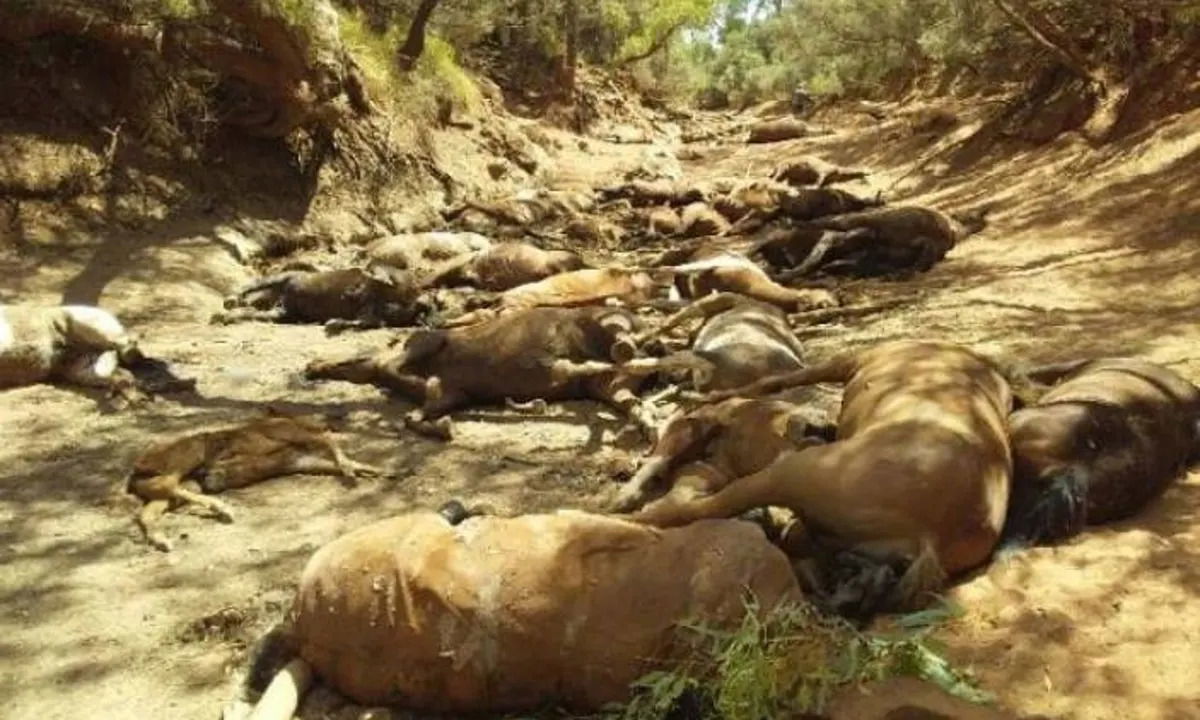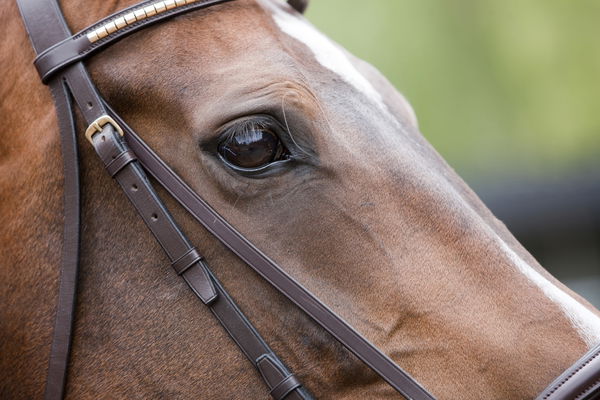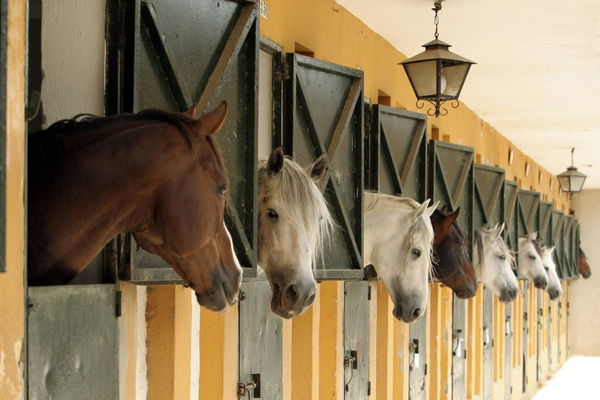

The Chteau de Versailles will come alive with equestrian excitement from July 27 to August 6 at the Paris Olympics. The epicenter of French royalty will welcome nearly 200 riders set to compete across three disciplines in individual and team competitions.
Watch What’s Trending Now!
However, as excitement grows with just over 50 days until the Paris Olympics, so does a growing concern regarding the main beings that make the sport so special: the horses themselves. Equine deaths are rising globally due to inadequate veterinary care and spreading viruses, sparking a massive crisis ahead of the Games.
ADVERTISEMENT
A deadly virus causes equine death ahead of the Paris Olympics
According to the BBC, Canaan Farm, an equestrian farm in Nottinghamshire, England, had to temporarily close its doors after one of their beloved horses sadly died from the Equine Herpes Virus (EHV). The British Horse Society describes this EHV virus as a “highly contagious airborne disease” that can affect horses worldwide. The farm’s owners were devastated by the loss and called it an “isolated incident.”

Imago
Horse stable corridor, Horse stable corridor. Equestrian facility created for accommodating horses, Horse stable corridor. Equestrian facility created for accommodating horses, 22.02.2023, Copyright: xWHPicsx Panthermedia33672554.jpg
They are working closely with local vets to manage the situation and they are testing all their other horses to ensure they’re not infected. Even though only one horse got sick, Canaan Farm wants to make sure all the other horses are safe. As a precaution, the farm has decided to shut down for a month and suspend all riding lessons to ensure every horse is healthy before resuming activities. This sad news highlights a growing problem as similar viral outbreaks continue to cause equine deaths around the world.
ADVERTISEMENT
Similar incidents and heartbreaking horse deaths in America
Back in California, Marlo Baird had a really special bond with her beloved horse, Nero. Marlo hadn’t ridden in years, but she got back into it when she turned 40 and instantly clicked with Nero, a beautiful black horse. They were supposed to have a great time together, especially at their first horse show in February 2022 at the Los Angeles Equestrian Center. After winning their event, Marlo described the feeling, saying, “We’d done it, and it felt like Olympic gold.” However, things took a tragic turn.
ADVERTISEMENT
The show was running behind both days, so Marlo and Nero ended up standing around in a crowd of horses, waiting for their turn. Marlo later learned that several horses at the LA February Show had traveled directly from the Desert International Horse Park, where an outbreak of EHV-1 had started a week earlier. Due to contact with another affected horse, sadly, Nero got infected. By Tuesday afternoon, Marlo received a call from her trainer: “Nero is showing neurologic symptoms.” Nero began having trouble moving his back legs, and despite Marlo and her friends’ best efforts, his condition worsened quickly.
Top Stories
Sources: John Harbaugh Wasn’t Fired, Left Ravens After Refusing Major Staff Changes

Bill Cowher’s Strong Message to Steelers on Firing Mike Tomlin After HC’s Blunt Playoff Message

Bengals’ Cam Taylor-Britt Sentenced to Jail: Everything We Know About Charges Against Him

Kyle Tucker Handed Blunt Reality Check as Blue Jays Shift Focus to Bolster Vladimir Guerrero Jr.

US Visa Rejections Put Major Track & Field Records at Risk at World Cross-Country Championships

Chiefs’ $58M News Complicates Travis Kelce’s Return As TE Gets 8-Figure Update

The vet came, but there wasn’t much they could do. They had to make the heartbreaking decision to euthanize Nero to stop his suffering. Marlo was devastated. She felt this could have been prevented if the people in charge had been more careful and followed the rules. She wants changes in the horse world so that this kind of tragedy doesn’t happen again. Sadly, more incidents like this have added to the heartbreak in the equestrian community.
ADVERTISEMENT

In Charleston County, South Carolina, a horse had to be put down after catching West Nile Virus (WNV), highlighting how crucial it is to vaccinate horses against mosquito-borne diseases. This poor horse wasn’t vaccinated and, with no other horses around, got sick during a warm and soggy winter that gave mosquitoes a breeding ground, bringing the virus early. Clemson University officials confirmed the diagnosis and urged horse owners to adhere to a strict vaccination schedule to protect their animals. State Veterinarian Michael Neault highlighted the increased risk due to the climate and emphasized that vaccination is the most effective safeguard against diseases like WNV and Eastern Equine Encephalitis (EEE).
ADVERTISEMENT
Despite measures like using repellents and limiting outdoor exposure at peak mosquito times, the mortality rate for these diseases remains high—30–40% for WNV and up to 90% for EEE in unvaccinated horses. The symptoms kick in fast, with stumbling, circling, and muscle twitches showing up within days, needing a quick call to the state authorities. It’s a sad reminder that preventive care is key to keeping our beloved horses healthy and happy. Unfortunately, the horrors kept adding to the list, casting a dark shadow over the equestrian community.

ADVERTISEMENT
In April 2024, Equine Herpes Myeloencephalopathy (EHM) was detected in six counties in Wisconsin, just before the big Midwest Horse Fair in Madison, where over 700 horses from around the country were expected. Due to this virus, Madison Police decided not to bring their horses to the fair to avoid the risk of them getting sick. EHM, which can cause respiratory and neurological problems in horses and can sometimes be fatal, poses a significant concern. The fair was important for fundraising for the Madison Mounted Horse Patrol, and although their horses were not present, the profits still supported their care.
The Midwest Horse Fair released a statement saying, “We want to let you know that the Midwest Horse Fair (MHF) Animal Health Coordinator and Country View Equine Clinic, the official veterinarians of MHF, are working closely with WI Department of Agriculture, Trade and Consumer Protection (DATCP) to keep our horse participants safe.”
ADVERTISEMENT
They implemented extra precautions, including health questionnaires, temperature checks, and sanitizing stalls and arenas. If any horse showed a fever or other signs of illness, it was removed from the fair. As we contemplate these tragic losses to viral outbreaks, another incident emerged, igniting outrage within the equestrian community and resulting in the heartbreaking loss of nearly 17 horses.
Neglect case that fueled outrage in the community
In southeast Nebraska, the equestrian community was rocked by another heartbreaking incident that left 17 horses under veterinarian Jennafer Glaesemann’s care dead. The story unfolded with Shelby, one of the survivors, being auctioned off for thousands after her recovery, yet most of the proceeds ended up in Glaesemann’s pockets despite clear signs of neglect. Reports of skinny, motionless horses started circulating between June and August 2023, leading to the grim discovery of 11 horse carcasses on Glaesemann’s property.
ADVERTISEMENT

Imago
Stallanlage in Jerez de la Frontera, Spanien, Andalusien horse stable in Jerez de la Frontera, Spain, Andalusia BLWS164157
Stall plant in Jerez de La Frontera Spain Andalusia Horse stable in Jerez de La Frontera Spain andalusia BLWS164157
The Gage County Sheriff intervened, seizing the remaining horses and estimating that 17 had perished by mid-August. Understandably, this sparked widespread outrage in the community. However, despite extensive evidence of neglect, legal red tape, and the county attorney’s reluctance to press charges, citing doubts due to some horses testing positive for equine parvovirus, this only fueled the frustration. Furthermore, donations intended for the horses’ care didn’t benefit the rescue, further fueling the outrage. With Glaesemann’s clinics still in operation and her veterinary license renewed, locals are left demanding justice for the neglected horses and accountability from the authorities.
As we mull over these heartbreaking concerns, it’s clear that accountability and extra care are essential in looking after these beautiful creatures. With the Paris Olympics on the horizon, it’s high time for more discussions on these pressing issues to guarantee the safety and well-being of all involved in the sport. What are your thoughts on these saddening losses within the community? Let’s hear your perspective in the comments below!
ADVERTISEMENT
ADVERTISEMENT
ADVERTISEMENT

